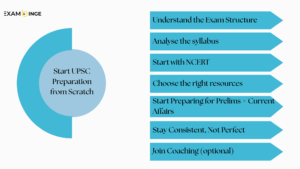So, You have decided to appear for the UPSC exam and it’s overwhelming. Around 13 Lakh students appear in exams every year and only approx 1,000 students make it to the final selection. Seems Impossible? UPSC preparation requires discipline, structure and a clear strategy.
This article provides a step-by-step guide to the preparation of the UPSC exam- From exam pattern, subject-wise resources, planning technique to the best UPSC coaching in Delhi. Let’s begin our journey.

Understand the Exam Structure:
Conducted on the national level, UPSC is one of the toughest exams in the world. One of the key reasons for its difficult nature is the exam structure. Let’s understand it better:
The UPSC exam is divided into three stages: Prelims, Mains, and Interview.
The multi-stage structure of the UPSC Civil Services Examination is deliberately designed to test a wide range of skills, making the exam challenging and comprehensive.
The Preliminary Examination:
- It is objective in nature
- Test factual knowledge, speed, and accuracy.
It consists of 2 papers:
- General Studies Paper I (200 marks) – used for cut-off.
- CSAT (Paper II) (200 marks) – qualifying (need 33% to pass).
3. Conducted in a single day.
The Mains Examination:
- Descriptive type – marks are added to the final merit.
- Comprises 9 papers:
- 2 Qualifying Papers: English and Indian Language.
7 Merit Papers:
- Essay
- 4 General Studies Papers (GS I–IV)
- 2 Optional Subject Papers (Paper I & II)
Each paper is of 250 marks; total of 1750 marks.
Requires in-depth understanding, analysis, and answer-writing skills.
The Interview:
- Conducted by the UPSC Board after Mains results.
- Carries 275 marks.
- Evaluates personality traits like confidence, clarity of thought, decision-making, ethics, and awareness of national and international issues.
- Final merit is calculated from Mains (1750) + Interview (275) = 2025 marks.
Analyse the syllabus:
Understanding and analyzing the syllabus is one of the most crucial steps for every aspirant in preparing for the examination.
UPSC provides both the Preliminary and Mains exam syllabus on its official website, which should serve as your primary roadmap throughout the preparation journey.
Find the syllabus here: UPSC 2025 Syllabus
Start with NCERT:
NCERT is the foundation of UPSC preparation. Most toppers recommend starting with NCERTs because they cover the basics directly from the syllabus, and more importantly, they help you develop a strong conceptual understanding.
Why NCERTs Matter:
- The language is simple – Perfect for beginners.
- Factual and reliable – Information is authentic and directly sourced.
- Builds conceptual clarity and helps you understand the why behind everything, not just the what.
- Questions often come from them, especially in subjects like History, Geography, Economy, and Environment.
Choose the right resources for you UPSC Preparation:
After forming a foundation on the NCERT books, it’s time to select standard books and reliable notes to excel your UPSC preparation.
Here’s a subject-wise list of standard books you might need:
Polity – Laxmikanth (Bible for Indian Polity)
Modern History – Spectrum by Rajiv Ahir
Geography – GC Leong + NCERTs + PMF IAS notes
Economy – Mrunal.org notes/videos + Class 11 & 12 NCERTs
Environment – Shankar IAS Book + PMF IAS environment notes
Science & Tech – Keep it current with newspapers + Vision IAS notes
Ethics (GS Paper 4) – Lexicon or G Subba Rao
There are tons of UPSC notes in the market, and many times, aspirants get stuck in the spider web of these PDFs and books. Here are the top 5 notes the toppers swear by:
99Notes – A rising star! Their notes are structured, visually clean, and perfect for quick revision. Great for both Prelims and Mains.
Vision IAS – Their monthly current affairs & value-added material are gold.
ForumIAS – Great for Mains content and optional-specific notes.
InsightsIAS – Their daily answer writing and secure initiative build consistency.
IASbaba – Crisp notes, especially useful for revision and prelims capsules.
Mrunal – Especially for Economy and Budget. Very beginner-friendly.
Start Preparing for Prelims + Current Affairs:
Start your UPSC preparation with Prelims. But here’s the trick: combine the static subjects with the daily current affairs to reinforce them in your daily routine.
Tips:
- Instead of jumping around the static portion and current affairs every month, do them side by side daily.
- Divide your day into two core study blocks: Static + Current.
- Pick just one static subject per day to avoid burnout.
- Read or revise current affairs daily, even for just 30 minutes.
- Keep weekends for revision + practice tests.
- Use one notebook or app to link current events with static topics.
- Follow this flexible daily structure (for all students)
| Study Block | Focus Area | Notes |
| Block 1 | Static Subject (2–3 hours) | Choose one subject daily (e.g., History, Polity) |
| Break Time | Rest, Meals, Personal Activities | Recharge your mind |
| Block 2 | Current Affairs | Read, summarize, and connect to static |
| Block 3 (Optional) | Practice MCQs or Revisions (30 mins- 1 hour) | Do this if time/energy allows |
To learn more tips and tricks from the toppers, read this article: Top 10 UPSC Tips for the Toppers!
Best Newspaper to refer to:
- The Hindu – Crisp language, reliable, widely preferred
- The Indian Express – Better for in-depth analysis, editorials
Stay Consistent, Not Perfect:
UPSC Preparation is a marathon, not a sprint. Consistency is the key to performing well.
- It’s okay to start late. What matters is how consistent and disciplined you are not you early as you started.
- Take breaks and avoid burnout.
- Prioritize your head and well-being.
Best UPSC Coaching for UPSC Preparation(Completely optional)
While coaching is not mandatory to clear the UPSC Civil Services Examination, it can be very helpful for many aspirants, especially those who need structured guidance, expert mentorship, and a disciplined routine. Coaching institutes offer mock tests, answer writing practice, and updated material, which can significantly improve your UPSC preparation if used wisely. However, self-study with the right resources is also a valid and successful path.
If you’re considering joining coaching, here are some reputed UPSC coaching institutes in India:
- Vision IAS – Known for test series and current affairs material
- 99Notes – Emerging platform offering structured notes and affordable materials
- ForumIAS – Popular for answer writing and interview guidance
- Drishti IAS – Well-known for Hindi-medium aspirants
- Vikram and Ravi IAS- Pioneers in the area of high-quality UPSC Preparation
Ultimately, choose coaching based on your needs, language preference, learning style, and budget. And remember—no institute can guarantee success. Your consistency and effort will always be the biggest factors.
Conclusion:
Starting your UPSC preparation in 2025 may feel daunting, but with the right strategy, resources, and mindset, it’s entirely achievable. Understanding the exam structure, building a strong foundation with NCERTs, choosing the right notes, and staying consistent with current affairs will set you on the right path. Whether or not you opt for coaching, your commitment and discipline are what truly matter in this journey.
Remember—every topper once began from scratch, just like you. So trust the process, pace yourself, and stay determined. The road to becoming a civil servant is not easy, but it’s certainly worth it.
Your journey starts today—make it count.
If you like this article, make sure to read 50 Common UPSC Interview Questions and Preparation Tips
How to started UPSC preparation in 2025 from scratch FAQs
Can I start UPSC preparation without any prior humanities background?
Yes, you can start UPSC preparation without a humanities background. The UPSC Civil Services Examination tests general knowledge, analytical skills, and aptitude, which can be developed from scratch with dedication. Many successful candidates from science, engineering, or other non-humanities fields have cleared the exam by following a structured study plan. Begin with NCERT textbooks (Class 6–12) to build foundational knowledge in subjects like History, Geography, Polity, and Economy. Supplement this with standard reference books, daily newspaper reading for current affairs, and consistent practice. Your ability to learn, adapt, and stay disciplined matters more than your academic background.
How do I choose an Optional Subject for Mains?
Choose an optional subject based on your interest, available study resources, and overlap with General Studies. Subjects like Public Administration, Sociology, or Geography align with GS papers, saving time. Check scoring trends for subjects like Anthropology or Literature. If you have prior knowledge (e.g., engineering for Mathematics), leverage it. Review the syllabus, consult mentors, and pick a subject you enjoy studying. Popular choices include Anthropology, Sociology, and History.
To understand the importance of the optional subject in UPSC Mains, read our detailed article.
Can I prepare for UPSC while working full-time?
Yes, you can prepare for UPSC while working full-time with effective time management. Dedicate 3–4 hours daily to focused study, prioritizing high-weightage topics like Polity, Economy, and Current Affairs. Use weekends for intensive preparation, revision, and mock tests. Leverage online resources, such as YouTube lectures and apps, for flexibility. Maintain a concise study plan, focusing on NCERTs and standard books. Stay consistent, avoid burnout, and track progress with weekly goals. Many working professionals have cleared UPSC with discipline and strategic planning.
What is the eligibility for UPSC CSE 2025?
To be eligible for UPSC CSE 2025:
Educational Qualification: A bachelor’s degree from a recognized university.
Age Limit: 21–32 years as of August 1, 2025 (relaxations for reserved categories: OBC up to 35, SC/ST up to 37).
Number of Attempts: General (6), OBC (9), SC/ST (unlimited until age limit).
Candidates in their final year of graduation can also apply, provided they complete their degree before the Mains. Check the official UPSC notification for detailed criteria.




